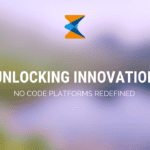
Unlocking Innovation: No Code Platforms Redefined
June 3, 2023
No-code Low-Code Statistics: Why No-Code Development is an In-demand Technology?
July 6, 2023Empowering Innovation Without Coding
Table of Contents
- Introduction
- Benefits of No Code Platforms
- Use Cases and Applications
- Example 1: Building a Customer Relationship Management (CRM) System
- Example 2: Creating a Workflow Automation Tool
- Example 3: Developing an E-commerce Website
- The Future of No Code Development
Introduction
No code platforms have revolutionized the way software applications are developed, allowing individuals and businesses to create powerful applications without the need for extensive coding knowledge. These platforms provide visual interfaces and pre-built components that enable users to design, build, and deploy applications with ease. Whether you are a business owner, a product manager, or a citizen developer, no code platforms can empower you to bring your ideas to life.
Benefits of No Code Platforms
No code platforms offer several advantages that make them appealing for various use cases:
- Rapid Development: With no code platforms, you can create applications quickly and efficiently, reducing development time significantly.
- No Coding Knowledge Required: These platforms eliminate the need for extensive coding knowledge, allowing individuals with little to no programming experience to create sophisticated applications.
- Cost-Effective: Building applications with traditional coding methods can be expensive, requiring skilled developers and resources. No code platforms provide a cost-effective alternative.
- Flexibility and Agility: No code platforms enable rapid prototyping and iteration, making it easier to adapt to changing requirements and market needs.
- Empowering Citizen Developers: No code platforms empower non-technical users to become citizen developers, fostering innovation and reducing reliance on IT departments.
Use Cases and Applications
No code platforms find applications across a wide range of industries and use cases. Let's explore some examples:
Example 1: Building a Customer Relationship Management (CRM) System
A no code platform can be utilized to create a CRM system tailored to your specific business needs. You can design custom data models, create forms for data input, and define automated workflows for lead management, customer communication, and sales pipeline tracking. With the ability to integrate with existing systems and APIs, you can build a comprehensive CRM solution without writing a single line of code.
Learn more about CRM systems and how they can benefit your business in this CRM Systems Explained article.
Example 2: Creating a Workflow Automation Tool
No code platforms enable the creation of workflow automation tools that streamline business processes. You can visually define workflows, set up triggers and actions, and integrate with various services to automate repetitive tasks. Whether it's automating approval processes, sending notifications, or synchronizing data across multiple systems, a no code platform empowers you to optimize your workflows without writing complex code.
Discover more about workflow automation and its benefits in this Benefits of Workflow Automation article.
Example 3: Developing an E-commerce Website
No code platforms provide the tools to build professional e-commerce websites without coding. You can leverage pre-built templates, drag-and-drop editors, and integrations with payment gateways and inventory management systems. With the ability to customize the design, layout, and functionality, you can create an online store that meets your business requirements and engages your customers.
Learn more about the key features of successful e-commerce websites in this Key Features of Successful E-commerce Websites article.
The Future of No Code Development
No code platforms continue to evolve rapidly, unlocking new possibilities for innovation and digital transformation. As these platforms mature, we can expect:
- Increased Customization: No code platforms will offer more extensive customization options, enabling users to create highly tailored applications.
- Enhanced Integration Capabilities: Integration with third-party services and APIs will become even more seamless, allowing for richer and more connected applications.
- Advanced AI and Machine Learning: No code platforms will incorporate AI and machine learning capabilities, enabling users to leverage intelligent algorithms without coding expertise.
- Collaborative Development: No code platforms will facilitate collaboration among teams, enabling multiple users to work together on application development projects.
Stay updated with the latest trends and advancements in no code development by visiting the Konfeeg Blog.
Conclusion
No code platforms have emerged as game-changers in the world of software development, offering a user-friendly and accessible approach to creating powerful applications. With their rapid development capabilities, ease of use, and flexibility, these platforms empower individuals and businesses to innovate and bring their ideas to life without extensive coding knowledge. As the no code movement continues to gain momentum, the possibilities for digital transformation and innovation are endless.
Start exploring the potential of no code platforms and unlock your creativity and productivity today!





